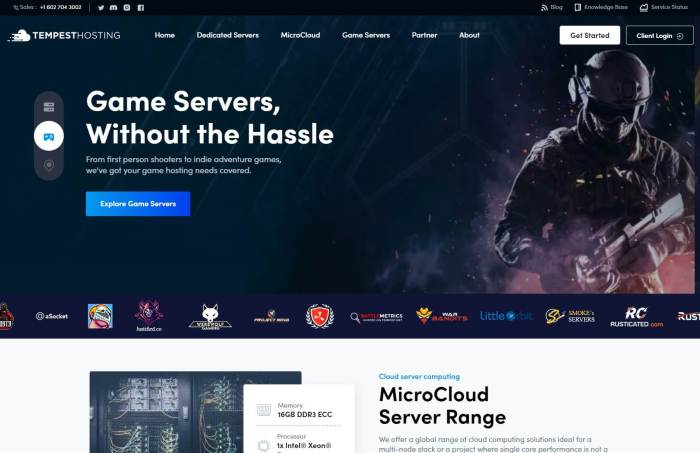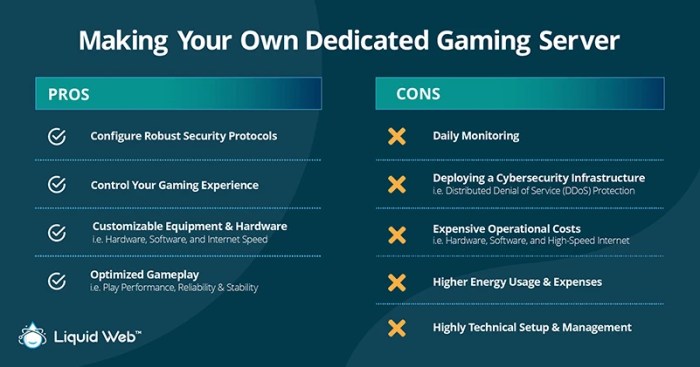Cloud hosting for gaming servers: performance and reliability – Imagine a world where your favorite online games run flawlessly, with no lag or interruptions. That’s the promise of cloud hosting for gaming servers, a technology revolutionizing the gaming landscape. Cloud hosting offers a powerful alternative to traditional server infrastructure, providing unparalleled performance, scalability, and reliability.
This shift is driven by the ever-growing demand for immersive, high-performance gaming experiences, and cloud hosting is uniquely positioned to meet these demands.
From massive multiplayer online role-playing games (MMORPGs) to competitive esports titles, cloud hosting empowers game developers and publishers to deliver seamless gameplay to millions of players worldwide. The technology leverages a network of interconnected servers, providing a flexible and scalable platform that can adapt to fluctuating player loads, ensuring a smooth and enjoyable gaming experience for everyone.
Reliability and Scalability

Cloud hosting for gaming servers is becoming increasingly popular due to its ability to provide high performance, reliability, and scalability. These features are crucial for ensuring a smooth and enjoyable gaming experience for players. In this section, we will explore the key factors that contribute to the reliability of cloud hosting for gaming servers, discuss the role of redundancy and failover mechanisms in ensuring uptime, and elaborate on the benefits of scalability in cloud hosting for gaming servers.
Reliability of Cloud Hosting for Gaming Servers
Reliability is paramount for gaming servers, as any downtime can result in frustrated players and lost revenue. Cloud hosting offers several advantages that contribute to its high reliability:* Redundancy and Failover Mechanisms:Cloud providers use redundant infrastructure to ensure that if one server fails, another can immediately take over.
This redundancy is achieved through multiple data centers, network connections, and servers. In the event of a failure, failover mechanisms automatically redirect traffic to a working server, minimizing downtime.
Automated Monitoring and Maintenance Cloud platforms provide comprehensive monitoring tools that track server performance, resource utilization, and potential issues. These tools automatically detect and alert administrators to any problems, allowing them to address issues before they impact gameplay. Regular maintenance tasks, such as software updates and security patches, are also automated, ensuring that servers are always up-to-date and secure.
Distributed Infrastructure Cloud providers have a global network of data centers, which allows them to distribute gaming servers across multiple locations. This geographical distribution helps to reduce latency for players, ensuring a smoother gaming experience regardless of their location. It also provides redundancy and disaster recovery capabilities, as servers in one location can continue to operate even if another location experiences an outage.
Scalability of Cloud Hosting for Gaming Servers
Scalability is another key advantage of cloud hosting for gaming servers. The ability to quickly and easily scale resources up or down based on demand is essential for handling peak traffic and ensuring a consistent gaming experience. Cloud hosting allows you to:* Scale Resources On-Demand:Cloud providers allow you to adjust your server resources, such as CPU, memory, and storage, in real-time.
This means you can easily scale up your infrastructure to accommodate a surge in players or scale down when demand decreases, optimizing costs.
Auto-Scaling Cloud platforms offer auto-scaling capabilities that automatically adjust server resources based on predefined metrics, such as CPU utilization or player count. This eliminates the need for manual intervention and ensures that your servers always have the resources they need to perform optimally.
Horizontal Scaling Cloud hosting allows you to easily add new servers to your infrastructure to handle increased traffic. This horizontal scaling approach is efficient and cost-effective, as you only pay for the resources you use.
Scaling a Gaming Server Infrastructure Using Cloud Hosting
Scaling a gaming server infrastructure using cloud hosting is a straightforward process. Here’s a step-by-step guide:
1. Choose a Cloud Provider Select a cloud provider that offers the features and resources you need for your gaming server. Consider factors such as performance, reliability, scalability, and pricing.
2. Define Your Scaling Requirements Determine the maximum number of players you expect to handle, the resources required per player, and the peak traffic you anticipate.
3. Set Up Your Server Infrastructure Deploy your gaming server instances on the cloud provider’s platform. Configure the necessary resources, such as CPU, memory, and storage.
4. Implement Monitoring and Alerting Configure monitoring tools to track server performance and resource utilization. Set up alerts to notify you of any issues or potential bottlenecks.
5. Enable Auto-Scaling Configure auto-scaling rules based on your scaling requirements. This will automatically adjust server resources based on predefined metrics.
6. Test and Optimize Thoroughly test your scaled infrastructure to ensure that it can handle the expected traffic load. Make adjustments to your scaling rules and configurations as needed.By following these steps, you can effectively scale your gaming server infrastructure using cloud hosting to meet the demands of your players and ensure a smooth and enjoyable gaming experience.
Security and Data Protection

Cloud hosting providers prioritize security, offering robust measures to protect gaming servers and player data. This ensures a secure and reliable gaming experience, minimizing risks and maintaining player trust.
Security Measures Implemented by Cloud Hosting Providers
Cloud hosting providers implement various security measures to protect gaming servers. These measures are designed to prevent unauthorized access, data breaches, and other security threats.
- Data Encryption:Sensitive data, such as player information and game files, is encrypted both in transit and at rest. This ensures that even if data is intercepted, it cannot be accessed without the appropriate decryption key.
- Firewalls:Firewalls act as barriers between the gaming servers and the external network, blocking unauthorized access attempts. They analyze incoming and outgoing traffic, filtering out malicious activity and protecting the servers from attacks.
- Intrusion Detection and Prevention Systems (IDPS):These systems monitor network traffic for suspicious activity and take immediate action to prevent attacks. They can detect and block various threats, including malware, exploits, and unauthorized access attempts.
- Multi-factor Authentication (MFA):MFA adds an extra layer of security by requiring users to provide multiple forms of authentication, such as a password and a one-time code, before granting access. This makes it significantly harder for unauthorized individuals to gain access to the servers.
- Regular Security Audits:Cloud providers conduct regular security audits to identify vulnerabilities and ensure that security measures are effective. These audits help maintain a high level of security and proactively address potential risks.
Protection Against DDoS Attacks
DDoS attacks are a common threat to online services, including gaming servers. These attacks attempt to overwhelm servers with excessive traffic, making them unavailable to legitimate users. Cloud hosting providers offer various solutions to mitigate DDoS attacks, ensuring that gaming servers remain operational.
- DDoS Protection Services:Cloud providers offer specialized DDoS protection services that analyze incoming traffic and filter out malicious requests. These services can identify and block attacks before they reach the servers, ensuring minimal impact on server performance.
- Distributed Network:Cloud hosting platforms leverage distributed networks, spreading server traffic across multiple data centers. This makes it harder for attackers to target a single point of failure, reducing the effectiveness of DDoS attacks.
- Traffic Scrubbing:Traffic scrubbing involves analyzing incoming traffic and filtering out malicious requests before they reach the servers. This helps to reduce the volume of attack traffic and minimize the impact on server performance.
Regulations and Compliance Standards
Cloud hosting for gaming servers must comply with relevant regulations and industry standards to ensure data privacy and security.
- General Data Protection Regulation (GDPR):This regulation sets out data protection rules for individuals in the European Union. Cloud providers must comply with GDPR requirements when handling personal data of EU citizens.
- California Consumer Privacy Act (CCPA):This law provides California residents with specific rights regarding their personal data. Cloud providers must comply with CCPA requirements when handling data of California residents.
- Payment Card Industry Data Security Standard (PCI DSS):This standard applies to organizations that process, store, or transmit credit card data. Cloud providers must comply with PCI DSS requirements to ensure the security of credit card information.
- Health Insurance Portability and Accountability Act (HIPAA):This law sets out data privacy and security requirements for healthcare providers. Cloud providers must comply with HIPAA requirements when handling protected health information (PHI).
Best Practices for Securing Gaming Servers in a Cloud Environment
In addition to the security measures provided by cloud providers, game developers and operators can implement best practices to further enhance the security of their gaming servers.
- Strong Passwords and Access Control:Use strong passwords for all accounts and implement multi-factor authentication for sensitive accounts. Restrict access to servers based on the principle of least privilege, granting only necessary permissions to individuals.
- Regular Software Updates:Regularly update server operating systems, applications, and game software to patch vulnerabilities and mitigate security risks. This helps to prevent attackers from exploiting known weaknesses.
- Security Monitoring and Logging:Implement security monitoring tools to detect suspicious activity and analyze logs for potential security breaches. This allows for early detection and response to security incidents.
- Data Backup and Recovery:Regularly back up server data and game files to ensure that data can be recovered in case of a security breach or disaster. This helps to minimize data loss and downtime.
- Security Awareness Training:Train server administrators and game developers on security best practices to reduce the risk of human error and accidental security breaches. This includes awareness of phishing attacks, social engineering, and other common threats.
Cost and Cost Optimization: Cloud Hosting For Gaming Servers: Performance And Reliability

Cloud hosting for gaming servers, while offering numerous advantages, also comes with a cost. Understanding the factors that influence these costs and implementing optimization strategies is crucial for ensuring sustainable and cost-effective operation.
Cost Factors
The cost of cloud hosting for gaming servers is influenced by various factors, including:
- Server Instance Type:The type of server instance chosen, based on CPU cores, RAM, storage, and network bandwidth, directly impacts the cost. Higher-performance instances with greater resources naturally incur higher costs.
- Operating System:Different operating systems, such as Windows or Linux, have varying pricing structures. Linux-based systems are generally more cost-effective.
- Data Transfer:The amount of data transferred in and out of the server, including game updates, player data, and streaming content, can contribute significantly to the overall cost.
- Storage:The type and amount of storage used, whether it’s SSD or HDD, can impact the cost. SSD storage, offering faster performance, is generally more expensive.
- Region:The geographical location of the server can affect pricing, with some regions potentially having higher costs due to infrastructure or regulatory factors.
- Usage Patterns:The peak and off-peak usage patterns of the server can influence the cost. Utilizing reserved instances or spot instances can help optimize costs during periods of lower demand.
- Additional Services:Cloud providers often offer additional services such as load balancing, firewalls, and monitoring, which can incur additional costs.
Pricing Models
Cloud hosting providers offer various pricing models for gaming servers, including:
- Pay-as-you-go:This model charges based on actual usage, allowing for flexibility and scaling. However, costs can escalate quickly during peak usage periods.
- Reserved Instances:These offer discounted pricing for committing to a specific instance type and duration. Reserved instances are ideal for predictable workloads and can significantly reduce costs.
- Spot Instances:These are surplus server instances offered at deeply discounted rates. However, they are subject to interruption and are best suited for workloads that can tolerate downtime.
Cost Optimization Tips
Optimizing the cost of cloud hosting for gaming servers requires a strategic approach:
- Right-Sizing Instances:Choose server instances that meet the performance requirements without overprovisioning. Regularly monitor resource utilization and adjust instance sizes as needed.
- Leverage Reserved Instances:Utilize reserved instances for predictable workloads, ensuring cost savings through discounted pricing.
- Explore Spot Instances:Consider spot instances for non-critical tasks or workloads that can tolerate interruptions, taking advantage of significant cost reductions.
- Optimize Data Transfer:Minimize unnecessary data transfers by implementing efficient game updates, compressing data, and utilizing content delivery networks (CDNs) for distributing game assets.
- Efficient Storage Management:Utilize SSD storage for frequently accessed data, while opting for HDD storage for less frequently accessed data to reduce costs.
- Automate Scaling:Implement auto-scaling features to automatically adjust server capacity based on real-time usage, ensuring optimal resource allocation and cost control.
- Monitor and Analyze Costs:Regularly monitor and analyze cloud hosting costs, identifying areas for potential optimization and making necessary adjustments.
Cost Comparison
Here’s a table comparing the cost-effectiveness of different cloud hosting options:
| Option | Cost Factors | Cost-Effectiveness |
|---|---|---|
| Pay-as-you-go | Flexible, scalable, but can be expensive during peak usage | Suitable for unpredictable workloads, short-term projects |
| Reserved Instances | Discounted pricing for committed usage | Cost-effective for predictable workloads, long-term projects |
| Spot Instances | Deeply discounted pricing, but subject to interruption | Ideal for non-critical tasks, workloads tolerant of downtime |
Case Studies and Real-World Examples
Real-world examples showcase the tangible benefits of cloud hosting for gaming servers. These case studies provide valuable insights into how different gaming companies have leveraged cloud infrastructure to enhance performance, scalability, and security. By examining the challenges and successes encountered, we can gain a deeper understanding of the practical implications of cloud hosting for the gaming industry.
Success Stories and Challenges
These case studies highlight the successful implementation of cloud hosting for gaming servers, demonstrating its ability to address critical challenges faced by gaming companies.
- Riot Games:Riot Games, the developer of League of Legends, transitioned to Google Cloud to handle the massive traffic and player base of its popular game. They successfully addressed scalability issues, ensuring a smooth and consistent gaming experience for millions of players worldwide.
Google Cloud’s global infrastructure allowed Riot Games to provide low latency gameplay for players across different regions.
- Epic Games:Epic Games, the developer of Fortnite, chose AWS to power its popular battle royale game. AWS’s robust cloud infrastructure enabled Epic Games to manage the game’s immense popularity, accommodating millions of concurrent players and supporting frequent content updates. AWS’s elasticity and scalability allowed Epic Games to adjust resources on demand, ensuring optimal performance during peak hours and major events.
- Blizzard Entertainment:Blizzard Entertainment, the developer of World of Warcraft, utilizes Azure to host its popular MMORPG. Azure’s cloud services provided Blizzard with the necessary resources to manage the game’s complex world and massive player base. Azure’s high availability and disaster recovery capabilities ensured minimal downtime and uninterrupted gameplay for players.
Key Factors Contributing to Success
Several key factors have contributed to the successful implementation of cloud hosting for gaming servers in these case studies.
- Scalability and Elasticity:Cloud hosting provides the ability to scale resources up or down on demand, ensuring optimal performance during peak hours and events. This eliminates the need for expensive hardware investments and allows gaming companies to efficiently manage their infrastructure costs.
- Performance and Reliability:Cloud providers offer high-performance infrastructure and robust network connectivity, minimizing latency and ensuring a smooth and consistent gaming experience for players. This is crucial for competitive online gaming where milliseconds matter.
- Security and Data Protection:Cloud providers offer advanced security features and data protection measures, safeguarding sensitive player data and ensuring a secure gaming environment. This is essential for maintaining player trust and complying with regulatory requirements.
- Cost Optimization:Cloud hosting offers flexible pricing models and pay-as-you-go options, allowing gaming companies to optimize their infrastructure costs based on actual usage. This helps to reduce capital expenditures and improve profitability.
Future Trends and Innovations

The landscape of cloud hosting for gaming servers is constantly evolving, driven by advancements in technology and the ever-growing demands of the gaming industry. Emerging trends like edge computing and serverless architectures are reshaping how games are hosted and delivered, paving the way for new experiences and possibilities.
Edge Computing
Edge computing brings processing power closer to users, reducing latency and improving responsiveness for online games. This is particularly beneficial for multiplayer games where real-time interactions are crucial.
- Reduced Latency:By processing data closer to players, edge computing significantly reduces latency, resulting in smoother gameplay and faster response times. This is crucial for competitive games where milliseconds can make a difference.
- Improved Performance:Edge servers can handle more players simultaneously, reducing strain on central servers and improving overall performance. This is especially important for large-scale games with a massive player base.
- Enhanced User Experience:With lower latency and faster processing, players experience a more immersive and responsive gameplay experience, leading to increased engagement and satisfaction.
Serverless Architectures, Cloud hosting for gaming servers: performance and reliability
Serverless architectures allow developers to focus on building game logic without worrying about server management. This approach offers flexibility, scalability, and cost efficiency.
- Scalability and Flexibility:Serverless functions automatically scale based on demand, ensuring optimal performance during peak hours and minimizing costs during low traffic periods.
- Cost Optimization:Developers only pay for the resources they consume, making serverless architectures cost-effective for games with fluctuating player populations.
- Simplified Development:Serverless functions eliminate the need for server management, allowing developers to focus on game development and innovation.
Future Innovations
- Artificial Intelligence (AI):AI-powered cloud services can enhance gameplay by providing personalized experiences, optimizing game performance, and even creating dynamic game environments.
- Virtual Reality (VR) and Augmented Reality (AR):Cloud hosting will play a crucial role in delivering high-quality VR and AR experiences, requiring robust infrastructure and low latency for immersive gameplay.
- Blockchain Technology:Blockchain can revolutionize in-game economies by providing secure and transparent transactions, enabling the creation of truly player-owned virtual assets.
Closing Notes

Cloud hosting is more than just a technical solution; it’s a game-changer for the gaming industry. By embracing cloud technologies, game developers and publishers can unlock new levels of performance, scalability, and reliability, delivering unforgettable gaming experiences to players around the globe.
The future of gaming is undoubtedly in the cloud, and the benefits are undeniable. So, buckle up and get ready for a thrilling ride into the world of cloud-powered gaming!